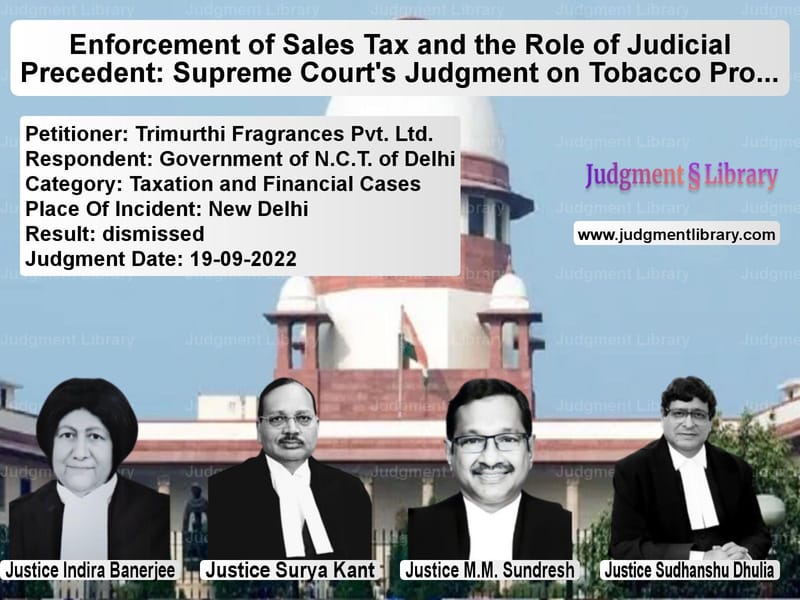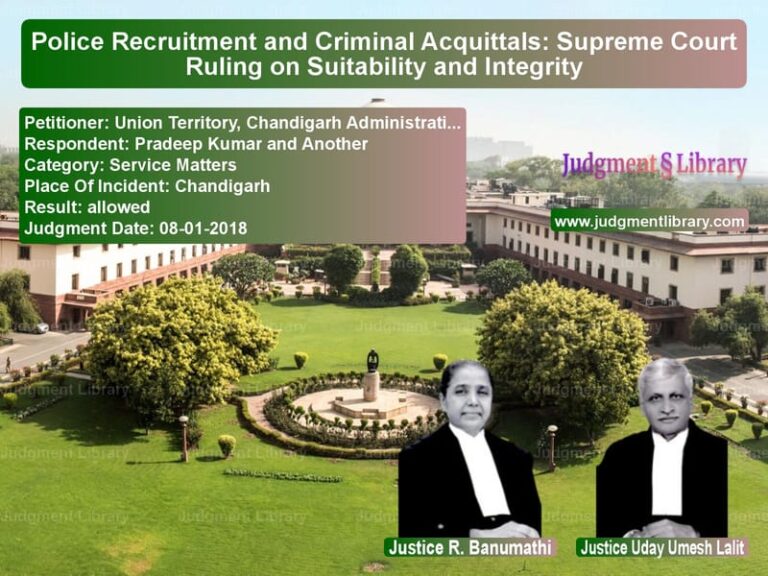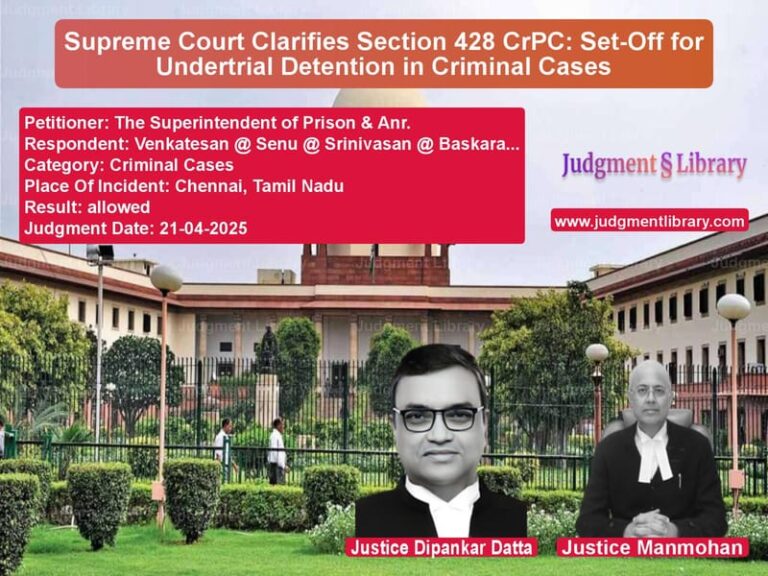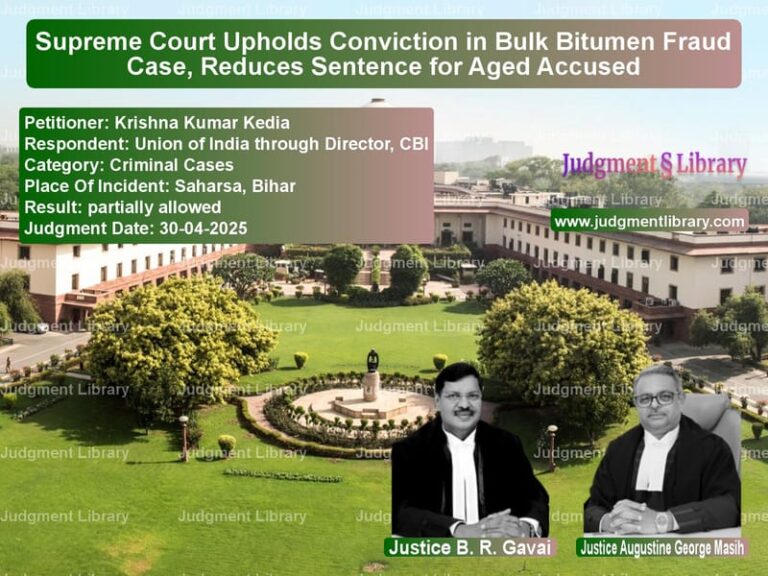Enforcement of Sales Tax and the Role of Judicial Precedent: Supreme Court’s Judgment on Tobacco Products
This case involves a dispute concerning the taxation of certain tobacco products under the Additional Duties of Excise (Goods of Special Importance) Act, 1957 (ADE Act), and their exemption from state-level sales tax. The Supreme Court of India was tasked with interpreting the interaction between state laws and central excise laws, specifically whether ‘pan masala’ containing tobacco and gutka could be taxed by the state under the Delhi Sales Tax Act, Uttar Pradesh Trade Tax Act, and Tamil Nadu General Sales Tax Act, or if they fell under the jurisdiction of the ADE Act.
The issue in the present case arose from a conflict between the central government’s jurisdiction over tobacco under the ADE Act and the authority of state governments to levy sales taxes on the sale of tobacco-related products. The appellant, Trimurthi Fragrances Pvt. Ltd., challenged the decision of the High Court of Delhi, which had ruled against the applicability of central excise duties on certain tobacco products and allowed state-level taxation.
The core question of this case was whether pan masala containing tobacco and gutka could be considered a commodity covered by the ADE Act, thus exempting it from state-level sales taxes. This judgment also considered the scope of judicial precedent, particularly regarding how Full Benches of the Court handle decisions of smaller Bench formations.
Read also: https://judgmentlibrary.com/supreme-court-rules-on-tax-recovery-radico-khaitan-cleared-of-liability/
Background of the Dispute
The appellant, Trimurthi Fragrances Pvt. Ltd., was engaged in the business of manufacturing and selling tobacco products, including pan masala and gutka. The respondent, the Government of N.C.T. of Delhi, had imposed sales tax on these products, which the appellant contested. The appellant argued that the tobacco content in these products fell under the scope of the ADE Act, which imposes additional excise duties and exempts such products from being taxed under state sales tax laws.
The issue had been previously addressed by the Delhi High Court, which held that these products could be taxed by the state under the Delhi Sales Tax Act, 1975. The appellant contended that the High Court’s interpretation was incorrect and that the products in question should be taxed under the ADE Act, which would exempt them from state-level taxation.
Petitioner’s Arguments
The petitioner, Trimurthi Fragrances, presented several arguments before the Supreme Court. The primary contention was that pan masala and gutka, which contain tobacco, fall under the goods specified in the First Schedule to the ADE Act. According to the petitioner, these products should not be subject to sales tax at the state level, as they are already covered by the excise duties under the ADE Act. The petitioner’s counsel referred to the previous ruling in *Kothari Products Ltd. v. State of Andhra Pradesh* (2000), where it was held that tobacco products covered under the ADE Act are exempt from sales tax under state legislation.
The petitioner’s counsel also cited *State of Orissa v. Radheshyam Gudakhu Factory* (2018), which held that Gudakhu, a product made from tobacco, was also covered by the exemption under the ADE Act. The petitioner argued that the same reasoning should apply to pan masala and gutka, and that the products in question should be exempt from state-level sales tax. They emphasized that the ADE Act, being a central law, takes precedence over state legislation in matters of tobacco taxation.
Respondent’s Arguments
The respondent, the Government of N.C.T. of Delhi, opposed the petitioner’s claim and argued that pan masala and gutka are not specifically covered by the ADE Act and should therefore be taxed under the state-level sales tax laws. The respondent’s counsel pointed out that while the ADE Act imposes excise duties on certain tobacco products, it does not automatically exempt all tobacco-related products from state taxation. They further contended that the inclusion of tobacco in the First Schedule of the ADE Act did not preclude states from taxing products containing tobacco that are not explicitly covered by the central law.
The respondent also referred to *Reliance Trading Co. v. State of Kerala* (2011), where the Supreme Court had held that state sales tax could be levied on certain products even if they were covered by central excise duties. The respondent argued that the same principle applied in this case and that the state had the right to impose sales tax on pan masala and gutka, which, although containing tobacco, are distinct from tobacco products covered by the ADE Act.
Court’s Reasoning
The Supreme Court carefully considered the provisions of the ADE Act, the Delhi Sales Tax Act, and other state-level taxation laws. The Court acknowledged that tobacco and its derivatives are subject to excise duties under the ADE Act, and that the central government has exclusive jurisdiction over such taxation. However, the Court also recognized that the ADE Act provides for additional duties of excise on certain goods, which may exempt them from state sales taxes if they are covered under the First Schedule to the Act.
The Court referred to previous rulings, including *Kothari Products Ltd.* and *Radheshyam Gudakhu Factory*, where it was held that goods covered by the ADE Act are exempt from state sales taxes. The Court noted that pan masala and gutka, though containing tobacco, are not explicitly listed in the ADE Act’s First Schedule and therefore do not qualify for the same exemption as tobacco products. The Court reasoned that the plain reading of the ADE Act did not support the appellant’s argument that all tobacco-related products, including pan masala and gutka, should be exempt from state taxation.
Read also: https://judgmentlibrary.com/supreme-court-rules-on-priority-of-government-dues-in-insolvency-cases/
The Court also examined the relationship between central and state taxation laws, noting that the ADE Act was specifically designed to impose additional excise duties on tobacco products, whereas state laws regulate the sale of goods within their jurisdictions. The Court emphasized that the ADE Act and state sales tax laws operate in different domains and that the imposition of sales tax by the state on pan masala and gutka was within the scope of state legislative authority.
Judgment
The Supreme Court dismissed the appeal filed by Trimurthi Fragrances Pvt. Ltd. and upheld the decision of the Delhi High Court, which had allowed the imposition of sales tax on pan masala and gutka under the Delhi Sales Tax Act. The Court ruled that pan masala and gutka, although containing tobacco, do not fall within the goods covered by the First Schedule of the ADE Act, and therefore, the state has the right to levy sales tax on these products.
The Court clarified that the ADE Act does not automatically exempt all tobacco-related products from state-level sales tax and that the imposition of sales tax by the state on products such as pan masala and gutka is lawful. The Court also emphasized the need to respect the legislative powers of the states in regulating the sale and taxation of goods within their jurisdictions.
Conclusion
This judgment reaffirms the legal distinction between central excise duties and state sales tax laws, particularly in relation to tobacco products and their derivatives. The Court clarified that while tobacco products may be subject to excise duties under the ADE Act, they are not automatically exempt from state-level sales taxes unless explicitly stated in the First Schedule of the Act. The ruling underscores the autonomy of state governments in imposing sales tax on goods, even those containing tobacco, unless a clear exemption exists.
The case also highlights the importance of judicial precedent in interpreting the scope of central and state taxation laws. The Court’s decision in this matter provides clarity on the application of the ADE Act and its relationship with state sales tax laws, particularly with respect to products such as pan masala and gutka.
Petitioner Name: Trimurthi Fragrances Pvt. Ltd..Respondent Name: Government of N.C.T. of Delhi.Judgment By: Justice Indira Banerjee, Justice Surya Kant, Justice M.M. Sundresh, Justice Sudhanshu Dhulia.Place Of Incident: New Delhi.Judgment Date: 19-09-2022.
Don’t miss out on the full details! Download the complete judgment in PDF format below and gain valuable insights instantly!
Download Judgment: trimurthi-fragrances-vs-government-of-n.c.t.-supreme-court-of-india-judgment-dated-19-09-2022.pdf
Directly Download Judgment: Directly download this Judgment
See all petitions in Income Tax Disputes
See all petitions in Customs and Excise
See all petitions in Banking Regulations
See all petitions in Tax Refund Disputes
See all petitions in GST Law
See all petitions in Judgment by Indira Banerjee
See all petitions in Judgment by Surya Kant
See all petitions in Judgment by M.M. Sundresh
See all petitions in Judgment by Sudhanshu Dhulia
See all petitions in dismissed
See all petitions in supreme court of India judgments September 2022
See all petitions in 2022 judgments
See all posts in Taxation and Financial Cases Category
See all allowed petitions in Taxation and Financial Cases Category
See all Dismissed petitions in Taxation and Financial Cases Category
See all partially allowed petitions in Taxation and Financial Cases Category







